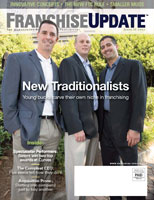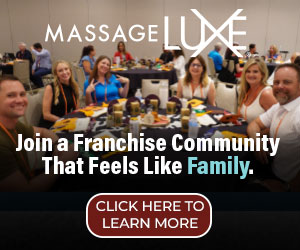Four innovative concepts continue to fuel franchising's growth
Innovation has played a progressive role in franchising since the beginning. Over the years, there have been new spins and fresh angles on all kinds of products, services, and concepts. As if there were any doubt, consider the more than 300 new franchise concepts introduced last year alone, according to franchise research firm FRANdata.
Darrell Johnson, FRANdata's president, tracks just this sort of information, analyzing trends and identifying industry developments. He says it's a rapidly developing and busy time to be in franchising, with new concepts popping up almost daily. And he keeps an eye on the innovators, those who carve out a new niche or offer a fresh twist on a product or service - and in some cases, come up with an idea that's brand new.
"There's a lot going on right now, especially in categories such as food preparation and delivery," says Johnson. He points to one concept right off the bat in this segment: Chicago-based Cereality, a concept centered entirely around breakfast cereals and drinks. The company is counting on consumers' appetites for morning goodies to last all day (see profile below).
Johnson says the continued growth in the fitness market and the various targeted approaches (separate concepts or a focus on men, women, new moms, and kids) is another area to watch. "This market's been hot for some time and is still continuing to refine and develop fresh angles," says Johnson. One of those new approaches is called Baby Boot Camp. No, it's not a military school for infants, but a fitness and workout regimen for new moms and their babies.
Many other unique and innovative franchise concepts are being dreamt up every day by creative and imaginary minds, says Johnson. And, if they're in the right place at the right time, they may just become the next globally successful concept in franchising.
Fast and healthy
When Dino Lambridis and two of his buddies graduated from college in the early '90s, they were looking for good careers - and healthier food served uniformly and quickly. They'd all been reading about the effects of high-fat food on the human body.
"We really researched this and discovered there was nobody doing healthy fast food," says Lambridis. So the three 20-somethings maxed out 10 credit cards to finance and launch a healthy, yet quick restaurant in Tampa, Fla.
"We tested dozens and dozens of recipes using all kinds of fresh and natural ingredients in that store," says Lambridis. He says they worked in their test store during the day and by night all three worked in fast-food restaurants to pick up knowledge about operating a restaurant.
After about a year of research, their test store, called EVOS, opened to the public in late 1994. The name is a derivative of "evolve" and fits with the trio's approach to offering better fast food, while reducing calories and fat and eliminating low-quality and processed ingredients.
Soy is a staple at EVOS but, Lambridis says, "This is not some kind of hippie place with New Age music playing in the background." They do, however, offer hormone-free chicken, cholesterol-free soy burgers, and organic field greens, among other nutritionally healthy choices. Beyond burgers, the store offers wraps and salads. Nothing is deep-fried and there are vegan-friendly offerings.
The trio continued to refine their offerings and operational approach over the next six years, opening three corporate stores in Tampa. They had their eyes on franchising eventually and opened their first franchise location in Las Vegas in late 2006; four more locations are on the way.
"We've just signed an area developer out west to open 107 stores throughout 12 states in the next 5 years," says Lambridis.
Lambridis believes there is a demand for healthy fast food out there. "Our customers and our franchisors agree this is a great way to have a burger, fries, and shake - without the guilt."
There is balance in everything, says Lambridis. "While there are vegetarian and vegan menu items, EVOS is not a health food restaurant. We are a restaurant that offers food for everyone done in a way that's sustainable." Just like their concept.
Fast fruit
Everybody likes fresh fruit, but when you go out to eat you probably don't find it much. And when you do, you're probably getting real fresh fruit less often than you might think. Enter Frutation, the newest concept from the folks at Connecticut-based Edible Arrangements.
"We noticed that when customers came to Edible Arrangements to order one of the fruit bouquets, they often asked for something they could take with them right then," says Kristy Ferguson, executive vice president.
It's naturally part of the trend of our fast-paced society to want something that's healthy and quick, says Ferguson. She calls the Frutation concept "fast fruit" for a grab-and-go culture. "It's premium, fresh fruit and all natural ingredients made right before the customers," she says.
Teaming up with sister company Edible Arrangements has made it easier to launch Frutation, as all of its locations so far are found within Edible Arrangements stores. The Frutation kiosks typically occupy from 150 to 250 square feet inside the stores. Employees at Frutation are easily distinguished from their Edible Arrangements cohorts by unique clothing, aprons, and caps.
So what's on the menu? Fruit smoothies (called Fruithies), fresh juices, fruit salads, fruit sundaes (just like regular sundaes, but made with fruit rather than ice cream), and individual pieces of dipped fruit (chocolate being an obvious favorite). Ferguson says what separates Frutation from other smoothie sellers is their premium fruit and ingredients with no additives or preservatives.
"There's nothing frozen, all fruit is cut fresh daily," says Ferguson. "And nobody else is preparing fresh fruit salads and unique offerings like fruit sundaes." She says the company is always researching, testing, and evaluating potential new menu items.
The first Frutation location opened in December 2006. Four Frutations are now operating within Edible Arrangements stores, with three more on the way.
One of the near-term goals, says Ferguson, is to open some standalone inline and kiosk locations in places like shopping mall food courts, airports, stadiums, and other high-traffic areas.
Baby on board
Kristen Horler had worked as a pastry chef and been a personal trainer before she married and started a family in 2001. But she still wanted to work and be active - and spend time with her new child.
"Staying in shape throughout a pregnancy, and then continuing after the baby comes is extremely important for women," says Horler. She soon discovered that, short of hiring a personal trainer or purchasing a pricey fitness club membership, nobody was offering such services for the new moms demographic.
Horler took matters into her own hands and, as she describes it, "grabbed three moms, the kids, the strollers and headed to the park." Thus was born Baby Boot Camp, a stroller fitness franchise for new moms and their babies.
The program helps new moms regain or enhance pre-pregnancy fitness levels and become better prepared for the physical challenges of parenting by emphasizing strength training in a supportive environment.
The concept is also a great opportunity for stay-at-home moms interested in a home-based business (although Horler points out it's not limited to only that kind of operator, or even just to women). The only facility required is a nice local park or the inside of a shopping mall before it opens at 10 a.m. That all works to make the initial franchise investment easier on the wallet.
Baby Boot Camp classes typically combine a cardiovascular workout of stretching and strength training. Participants will engage in Pilates, yoga, and abdominal exercises that help improve core strength. Brisk walks keep the heart pumping.
"It's a great way for new moms to stay active, meet other new moms, and not have to worry about a babysitter or childcare," says Horler.
The program itself is for women from pregnancy until the child is out of the stroller. Class sizes are limited to between 10 and 15, "a good low number that keeps it hands-on and interactive," says Horler. Class duration is usually between 55 and 75 minutes and available year-round. Instructors are all certified personal trainers or group exercise instructors.
Horler says she was amazed at how quickly the concept took off when she began it in San Francisco six years ago. It has since spread across the country, although not as quickly as she expected, in part because of government rules and regulations, she says. Today 75 franchisees are running classes in 300 locations in more than 20 states, Canada, and Australia.
"We're bringing on between five and eight new franchisees each month," says Horler. Competition has even sprung up, in the likes of Stroller Strides and StrollerFit franchises.
As the concept grows, Horler and her team (including her husband), now based in Sarasota, Fla., are refining processes and systems. She says they've just finished launching an e-business platform that offers support and access to the operations manual.
It's been hard work, says Horler, but she has few regrets. "I was just a mom who didn't want to put my baby in day care while I went to work. But in the process of solving my dilemma, I created this career not only for myself, but for a lot of other women out there who are looking for the same thing."
Selling Saturday morning
Americans love their cereal - hot, cold, crunchy, sweet, or however else it may come. Now, Chicago-based Cereality is serving up a fresh take on breakfast favorites and is looking for franchisees.
"Cereal is part of the daily routine for millions of Americans," says Cereality co-founder and CEO David Roth. "Our idea was to create a restaurant that's like a home away from home."
Cereality stores are designed to look like a home kitchen with familiar cereal brand boxes displayed in custom-built kitchen cabinets. Employees, called Cerealogists, are dressed in pajama-like outfits. Inside, cereal seekers will find farm table dining space, kitchen islands, window nooks, and comfy, oversized chairs and couches. Televisions play Saturday morning cartoons, and for customers who need to stay in touch, there's free Wi-Fi.
It's a whimsical idea that is catching on quickly. The company signed its first franchise location in State College, Penn., where it opened a 1,400-square foot facility on the campus of Penn State University. Four other company-owned stores are currently operating (Philadelphia, Tempe, Ariz., and two in the Chicago area).
The brand recently opened a "Cereality Express" (same concept, fewer choices) at Newark International Airport and has plans to add JFK in New York and O'Hare in Chicago later this spring.
Perhaps surprisingly, Roth says, Cereality attracts all kinds of customers, from youngsters and college kids to business types and moms with strollers. Likewise, there's something on the menu for just about any taste: more than 30 branded cereals from Quaker Oats to Kellogg's to General Mills, more than 40 different toppings, hot and cold cereals made to order, smoothies made with cereal, and Cereality's own BakeryBars (made from cereal). There's also a variety of milks (including soy and lactose-free) and a complete line of hot and cold beverages.
"And they don't just eat in the mornings," says Roth. "We're tracking our activity, and in places like Philadelphia, for example, we've discovered that not only are our customers coming several days a week, many of them come several times throughout the day."
The company started exploring the franchise angle about a year ago, according to Stan Synkoski, CEO of Cereality Franchising Corp. "We're very interested in multi-concept operators to help us expand," he says. "We've been analyzing the entire U.S. and are looking for territorial agreements with multi-unit operators."
Synkoski says the company's goal is for area developers to open 5 to 20 locations over 5 to 10 years. In addition to the State College franchise, the company has awarded 26 franchises in the Northeast. Synkoski says to look for more to come in California, Texas, Louisiana, and South Carolina.
"It was important for us to analyze and develop a solid franchise system that would allow us to expand properly," says Roth. "That's why we operated for four years before offering any franchising opportunities." He says they want to do things systematically, yet allow for customization and product mix adjustments based on the territory and regional tastes.
"We think it's a great concept," says Roth. "I always say we're not selling cereal, we're selling Saturday morning. With the right franchisees we can do that all over the country."
Share this Feature
Recommended Reading:
FRANCHISE TOPICS
- Multi-Unit Franchising
- Get Started in Franchising
- Franchise Growth
- Franchise Operations
- Open New Units
- Franchise Leadership
- Franchise Marketing
- Technology
- Franchise Law
- Franchise Awards
- Franchise Rankings
- Franchise Trends
- Franchise Development
- Featured Franchise Stories
FEATURED IN

Franchise Update Magazine: Issue 2, 2007








 The franchise listed above are not related to or endorsed by Franchise Update or Franchise Update Media Group. We are not engaged in, supporting, or endorsing any specific franchise, business opportunity, company or individual. No statement in this site is to be construed as a recommendation. We encourage prospective franchise buyers to perform extensive due diligence when considering a franchise opportunity.
The franchise listed above are not related to or endorsed by Franchise Update or Franchise Update Media Group. We are not engaged in, supporting, or endorsing any specific franchise, business opportunity, company or individual. No statement in this site is to be construed as a recommendation. We encourage prospective franchise buyers to perform extensive due diligence when considering a franchise opportunity.